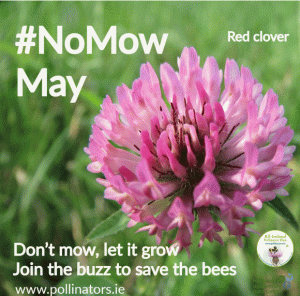#NoMowMay is an annual campaign asking everyone to put away the lawnmower during the month of May to help our native wildlife. Native Irish wildflowers like Dandelions, Clover, and Birds-foot trefoil provide the best source of pollen and nectar for our hungry wild pollinators. By mowing less, we can give them a chance to appear naturally – no seeds needed!
Why should I take part?
On the island of Ireland, one third of our wild bees are threatened with extinction. This is mainly because of hunger – there isn’t enough food to support them in our landscape. If all of us chose to put our lawnmowers away for one month, we could start creating a network of places where pollinators can survive and thrive.
How can I join in?
Taking part in No Mow May couldn’t be easier – just lock away the lawnmower for the month of May and wait and see what grows. You might be surprised by what appears over a few short weeks. You might see plants like Dandelions, Red and White Clover, and Birds-foot trefoil, all of which are excellent sources of food for pollinating insects, as well as bees, butterflies, and birds, all attracted by the feast on your lawn!
No Mow May » All-Ireland Pollinator Plan (pollinators.ie)
Reduce pesticide use
Uisce Éireann is asking everyone to consider using pesticides only where strictly necessary and only after the possibility of using other control methods has been carefully considered. Minimising pesticide use protects water quality. Leaving areas unsprayed can also help native flowering plant species to grow and support a range of insects including bees and other vital pollinators. Farmers should also bear in mind that the application of herbicides reduces sward species diversity and could negatively impact on payments through agri-environmental schemes.
Farmers and other landholders dealing with the challenge of rushes should note the Department of Agriculture, Food and the Marine (DAFM) guidance on the sustainable management of rushes. More information on this can be obtained from your local farm advisor or on www.pcs.agriculture.gov.ie/sud/waterprotection
If pesticides have to be used, the basic steps to reduce risks to drinking water sources and the aquatic environment are:
- Choose the right pesticide product (products containing MCPA are NOT approved for use in weed-wipers and are not permitted to be used from the end of September until the beginning of March).
- Read and follow the product label.
- Do not use pesticides if rain is forecast in the next 48 hours.
- Make sure you are aware of the location of all nearby water courses.
- Comply with any buffer zone specified on the product label to protect the aquatic environment. Mark out the specified buffer zone from the edge of the river or lake or other water course and drainage ditches.
- Avoid spills, stay well back from open drains and rinse empty containers 3 times into the sprayer.
- Store and dispose of pesticides and their containers properly.
- Never fill a sprayer directly from a water course or carry out mixing, loading or other handling operations beside a water course




